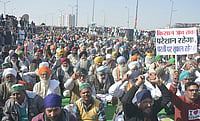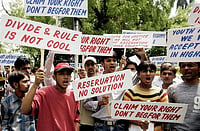The Election Commission of India (ECI) is set to demonstrate its Remote Voting Machines (RVMs) to political parties on Monday.
The Opposition parties are set to oppose the the RVMs. They have said that the ECI's proposal on RVMs is "sketchy" and not "concrete".
Though the Opposition has decided to largely oppose RVMs, the ECI has said that RVMs will benefit India's migrant population. Currently, people have to go to their home constituencies to vote which prevents many from exercising their frenchise as not everyone can travel. RVMs will allow them to vote from their current locations, according to the ECI.
Here we explain the idea behind the RVMs, how they would function, why the Opposition is against them, and what are the previous unfounded allegations against Electronic Voting Machines (EVMs).
The idea behind Remote Voting Machines (RVMs)
The focus of the Remote Voting Machines (RVMs) is the migrant population of India which cannot always vote as they are not always in a position to travel to their home constituencies.
The Election Commission of India (ECI) said, "Many a times migrants are reluctant to get themselves enrolled at their place of work for various reasons such as frequently changing residences, not enough social and emotional connect with the issues of area of migration, unwillingness to get their name deleted in an electoral roll of their home or native constituencies as they have permanent residence or property."
Chief Election Commissioner (CEC) Rajiv Kumar said, "After focus on youth and urban apathy, remote voting will be a transformational initiative for strengthening participation in electoral democracy."
The ECI also said that "migration-based disenfranchisement" is not an option in the age of technological advancement.
"It is understood that there are multifarious reasons for a voter not opting to register in a new place of residence, thus missing out on exercising the right to vote. Inability to vote due to internal migration (domestic migrants) is one of the prominent reasons to be addressed to improve voter turnout and ensure participative elections," said the ECI.
The ECI also flagged the voter turnout in the 2019 general elections.
"The voter turnout in General Elections 2019 was 67.4 per cent and the Election Commission of India is concerned about the issue of over 30 Crore electors not exercising their franchise and also differential voter turnout in various states/UTs," said the ECI earlier.
How will Remote Voting Machines (RVMs) work
Separate voting booths for remote voting will be set up and each booth will cover 72 constituencies, according to the Election Commission of India (ECI).
In floating the concept of Remote Voting Machines (RVMs), the ECI also acknowledged the "technological challenge" of counting of votes cast at remote booths and their transmission to the returning officer (RO) in other states.
However, the ECI said RVMs will be developed as "a robust, failproof and efficient stand-alone system" based on existing electronic voting machines and will not be connected to the internet.
The ECI has "has now explored the option of using a modified version of the time-tested model of M3 (Mark 3) EVMs to enable voting at remote polling stations -- polling stations outside home constituency, for domestic migrants", said an earlier statement from ECI.
Internally, the ECI had also explored other options along with RVMs. These options were: two-way physical transit postal ballots, proxy voting, early voting at special Early Voting Centres, one-way or two-way electronic transmission of postal ballots (ETPBS), Internet-based voting system etc.
However, the ECI finally went ahead with RVMs. A prototype has been developed by a public sector undertaking (PSU) and it will be demonstrated today.
Why is Opposition against RVMs?
Congress leader Digvijaya Singh on Saturday said that most of the Opposition parties will oppose Remote Voting Machines (RVMs) as the proposal of the Election Commission of India (ECI) is "sketchy" and not "concrete".
Singh's remarks came after a Congress-led meeting of Opposition parties.
Singh said, "The overall view of all political parties that attended today was to unanimously oppose the proposal of RVM because it is still very sketchy. The proposal is not concrete. There are political anomalies and problems in the proposal. The definition of migrant labour, the number of migrant labour is all not very clear. Therefore, we all have unanimously made up our mind to oppose the proposal of RVM."
Singh also called the RVM proposal "impractical".
He said, "The proposal given by the EC is most impractical, They have given a figure of 30 crore of migrant labour when survey has not been done."
Singh said the ECI has asked the parties to give their reply by January 31, and so those parties that attended the meeting will meet again on January 25 and send their reply either jointly or separately but with a clear view that they "don't support RVM".
RJD leader Manoj Jha said Opposition parties will ask all sorts of questions and raise three issues of credibility —credibility of commission, credibility of definition of migrant worker and credibility of the very idea of Article 324— holding free and fair elections.
Earlier, the Opposition parties have also made unfounded allegations of hacking and tampering of Electronic Voting Machines (EVMs) and have called for a return to paper ballots. One of the earliest case of such claims was the 2017 Uttar Pradesh assembly elections which the Bharatiya Janata Party (BJP) won.
Opposition's criticism of EVMs, claims of hacking
Well before the Election Commission of India (ECI) floated the idea of Remote Voting Machines (RVMs), the Opposition has criticised EVMs and unfounded allegations of hacking and tampering have been made.
In 2017, Bahujan Samaj Party (BSP) supremo Mayawati alleged after Uttar Pradesh assembly elections that the EVMs were hacked or tampered.
In 2019, in the run-up to the 2019 general elections, a person claiming to be named Syed Shuja, a self-proclaimed cyber-expert, held a press conference in London and made a series of unfounded claims. He claimed that the 2014 elections were rigged, that the late BJP leader Gopinath Munde was murdered as he knew the truth about hacking, and that a 13-member team working at a PSU was also killed.
Newslaundry reported that these claims were unfounded. It reported:
"Shuja says his 13-member team was working on Project Ms7b for the ECIL (Electronics Corporation of India Limited)...Shuja claims 11 members of the team were shot dead on the morning of May 13, 2014...Shuja claims 11 members of the team were shot dead on the morning of May 13, 2014, at the guesthouse of Kaki Reddy—brother-in-law of former BJP MLA Kishan Reddy—in the suburb of Uppal, Hyderabad...Newslaundry crisscrossed the five-kilometre radius of Little Flower Junior College for four hours. There is no guesthouse in the area owned by Kaki Reddy.
Among other claims —all unfounded— was that Jio helped BJP hack elections.
"Shuja claimed that Jio helped the BJP get low-frequency signals to hack EVMs. He said there are nine facilities from where Reliance is transmitting the data," reported Newslaundry. Notably, Jio was not established at the time of 2014 general elections.
Newslaundry further quoted Pune-based white-had hacker Ajit Hatti as saying, "Jio was not established at that time. Even if they were, they were operating under TRAI guidelines which were directly under the UPA government. Agencies like the IB, RAW, IT and Excise have access to every communication done by telecom operators. Such attacks—if at all possible—can’t go unnoticed."
India Today later reported that the a London-based company named Tri Colour News Network Ltd which promoted EVM and demonetisation conspiracy theories throughout the run-up to the 2019 elections, which were also shared by the Congress leaders, shut down within weeks of election results and its head switched to a tantrik massage business.
India Today reported, "Filings made before the United Kingdom's Registrar of Companies reveal that Diana Biciin, who is the only director looking after Tri Colour News Network Ltd has opened another company named Eva's Tantric Massage Ltd in London, the probe shows. Eva's website states that it offers no health or well-being related services but provides 'mutual love with girls from Spain, Brazil, Belarus, Moldova, England, Lithuania and Russia'."
(With PTI inputs)







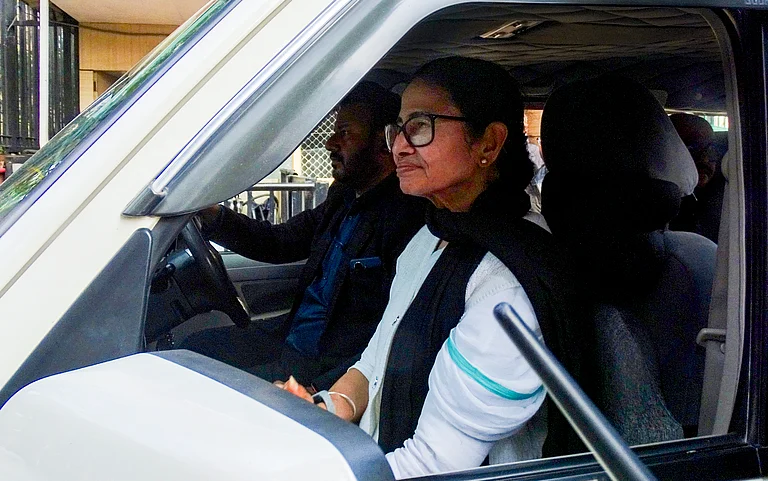
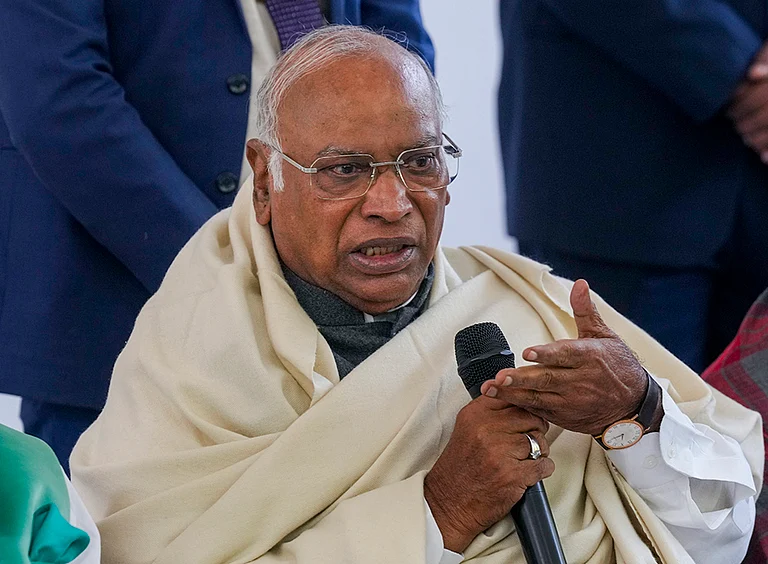
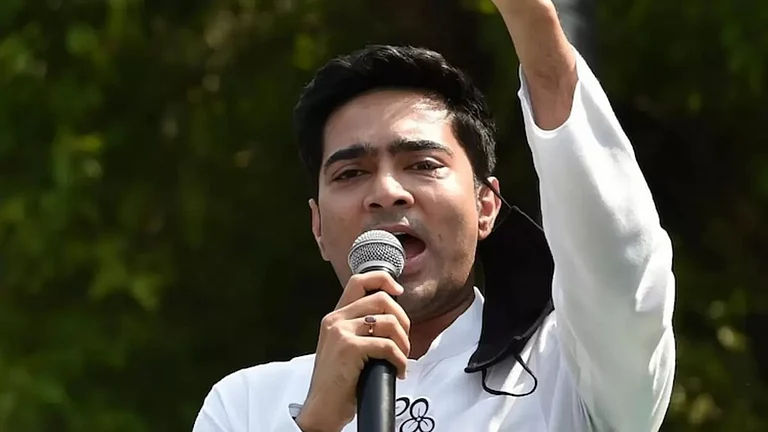
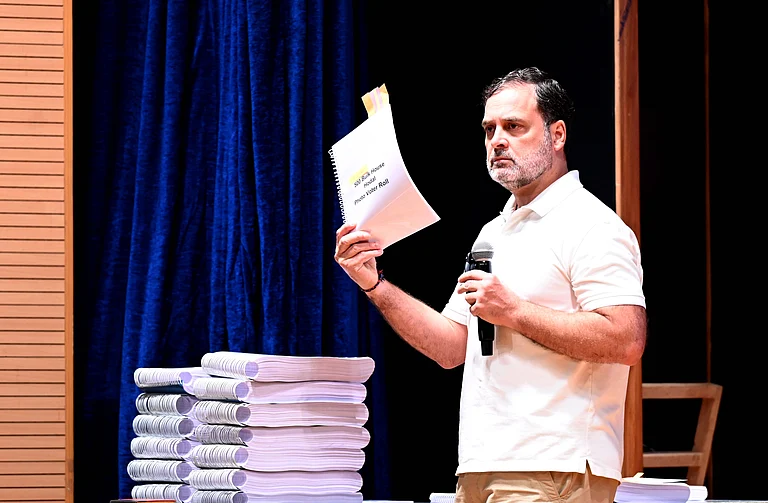

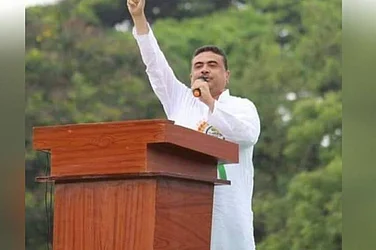
.png?auto=format%2Ccompress&fit=max&format=webp&w=376&dpr=2.0)






